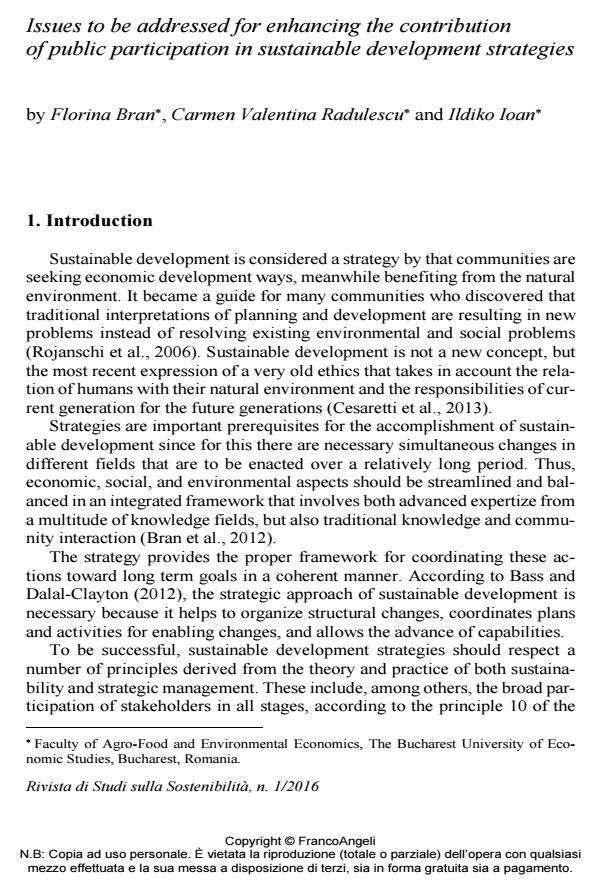Issues to be addressed for enhancing the contribution of public participation in sustainable development strategies
Titolo Rivista RIVISTA DI STUDI SULLA SOSTENIBILITA'
Autori/Curatori Florina Bran, Carmen Valentina Radulescu, Ildiko Ioan
Anno di pubblicazione 2016 Fascicolo 2016/1
Lingua Inglese Numero pagine 10 P. 25-34 Dimensione file 183 KB
DOI 10.3280/RISS2016-001004
Il DOI è il codice a barre della proprietà intellettuale: per saperne di più
clicca qui
Qui sotto puoi vedere in anteprima la prima pagina di questo articolo.
Se questo articolo ti interessa, lo puoi acquistare (e scaricare in formato pdf) seguendo le facili indicazioni per acquistare il download credit. Acquista Download Credits per scaricare questo Articolo in formato PDF

FrancoAngeli è membro della Publishers International Linking Association, Inc (PILA), associazione indipendente e non profit per facilitare (attraverso i servizi tecnologici implementati da CrossRef.org) l’accesso degli studiosi ai contenuti digitali nelle pubblicazioni professionali e scientifiche.
Accomplishment of sustainable development supposes changes that could affect the interest of various groups. In strategy development goal setting should consider not only the global perspective, but also the needs and possibilities that could be derived from local or regional contexts. Since public participation is not a straightforward process, there are a number of issues to be carefully addressed for enhancing its contribution in strategy development and implementation. The discussion regarding some of these issues highlighted that misrepresentation, overloading, low willingness to participate, and power disparities are the main challenges for the management of the participatory process
La realizzazione di uno sviluppo sostenibile presuppone cambiamenti che potrebbero influenzare l’interesse di vari gruppi. Nello sviluppo della strategia, la definizione degli obiettivi dovrebbe prendere in considerazione non solo la prospettiva globale, ma anche le esigenze e le possibilità che potrebbero essere derivati da contesti locali o regionali. Considerando che la partecipazione del pubblico non è un processo semplice, ci sono una serie di questioni da affrontare con attenzione per migliorare il suo contributo nello sviluppo e attuazione della strategia. Il dibattito per quanto riguarda alcuni di questi problemi ha evidenziato che il fraintendimento, l’appesantimento, la bassa disponibilità a partecipare e le disparità di potenza sono le principali sfide per la gestione del processo partecipativo.
Parole chiave:Partecipazione pubblica, strategia, stakeholders, management, sviluppo sostenibile.
Florina Bran, Carmen Valentina Radulescu, Ildiko Ioan, Issues to be addressed for enhancing the contribution of public participation in sustainable development strategies in "RIVISTA DI STUDI SULLA SOSTENIBILITA'" 1/2016, pp 25-34, DOI: 10.3280/RISS2016-001004